To view a PDF of slides presented during PRRI’s October 4, 2023, webinar about this report, please click here. For a replay of the PRRI webinar via YouTube, please click here.
Introduction
As the planet’s temperature continues to rise, producing more severe weather events and threatening our future well-being, many religious leaders have in recent years taken clear stances about the dangers that climate change poses. Pope Francis has made climate care an important part of his papacy by establishing a World Day of Prayer each September for the care of creation, and calling on governments to enact more regulations against the emission of fossil fuels and individuals to adopt more sustainable lifestyles. Ecumenical organizations in the United States, such as the National Council of Churches, have long spoken out for environmental causes, linking such concerns to the Christian doctrine of stewardship for the earth. The National Association of Evangelicals issued a sweeping report in 2022 that also called on its followers to address climate change, noting a “biblical basis” to “worship God by caring for creation.” Major Jewish, Muslim, and Hindu religious groups and their leaders have also called for environmental activism based on religious teachings.
While the scientific consensus is clear that human activities, particularly through carbon emissions, are the main culprit of climate change, political views differ with respect to the causes of climate change, its political importance, and how to address it. Moreover, religious views on climate change are far from monolithic.
This report covers Americans’ assessments of the threats of climate change, how it affects their lives and voting behavior, and what steps they are willing to take to combat climate change, with particular focus on the impact of religion on such views. We also consider how partisanship, media trust, race and ethnicity, generation, and education are linked to climate change attitudes. Furthermore, we explore Americans’ spiritual connections to the earth and reasons why they support taking action to protect the environment.
Americans’ Views on Climate Change
Causes of Climate Change
The majority of Americans (61%) believe that climate change is caused mostly by human activity, such as burning fossil fuels. Almost three in ten Americans (28%) say climate change is caused mostly by natural patterns in the earth’s environment. Just one in ten Americans (10%) say there is no solid evidence that climate change is happening.[1]
Religious Affiliation
Three-fourths of Hispanic Catholics and religiously unaffiliated Americans (76%) believe climate change is caused by human activity, as do the majority of other non-Christians (70%), Jewish Americans (67%), Hispanic Protestants (61%), Black Protestants (59%), other Protestants of color (59%), white Catholics (56%), white mainline/non-evangelical Protestants (54%), and about half of Latter-day Saints (48%). However, just three in ten white evangelical Protestants (31%) believe that climate change is caused by humans.[2]
White evangelical Protestants (49%) and Latter-day Saints (44%) are the most likely to believe that climate change is caused by natural patterns in the environment, compared with one-third of white mainline/non-evangelical Protestants (33%) and white Catholics (33%), 31% of other Protestants of color, 28% of Jewish Americans, 27% of Hispanic Protestants, 25% of Black Protestants, 20% of other non-Christians, and 18% of both Hispanic Catholics and religiously unaffiliated Americans.
Nearly two in ten white evangelical Protestants (19%) believe there is no solid evidence of climate change, which is slightly higher than other religious traditions, including 14% of Black Protestants, 12% of white mainline/non-evangelical Protestants and Hispanic Protestants, 10% of other Protestants of color and white Catholics, 9% of non-Christians, 8% of Latter-day Saints, 6% of Hispanic Catholics and religiously unaffiliated, and 5% of Jewish Americans.
As importance of religion wanes, belief that climate change is caused by humans increases. Among Americans who say that religion is the most important thing in their lives, 39% say that climate change is caused by humans, compared with 56% of those who say religion is one among many important things, 65% who say religion is not as important, and 78% who say religion is not important. In contrast, 40% of Americans who say that religion is the most important thing in their lives say that climate change is mostly caused by natural patterns in the earth’s environment, compared with 33% of Americans who say religion is one among many important things, 26% who say religion is not as important, and 16% who say religion is not important. Finally, 20% of Americans who say that religion is the most important thing in their lives are more likely than those who say religion is one among many important things (10%), who say religion is not as important (8%), and who say religion is not important (5%) to say that there is no solid evidence that climate change is happening.
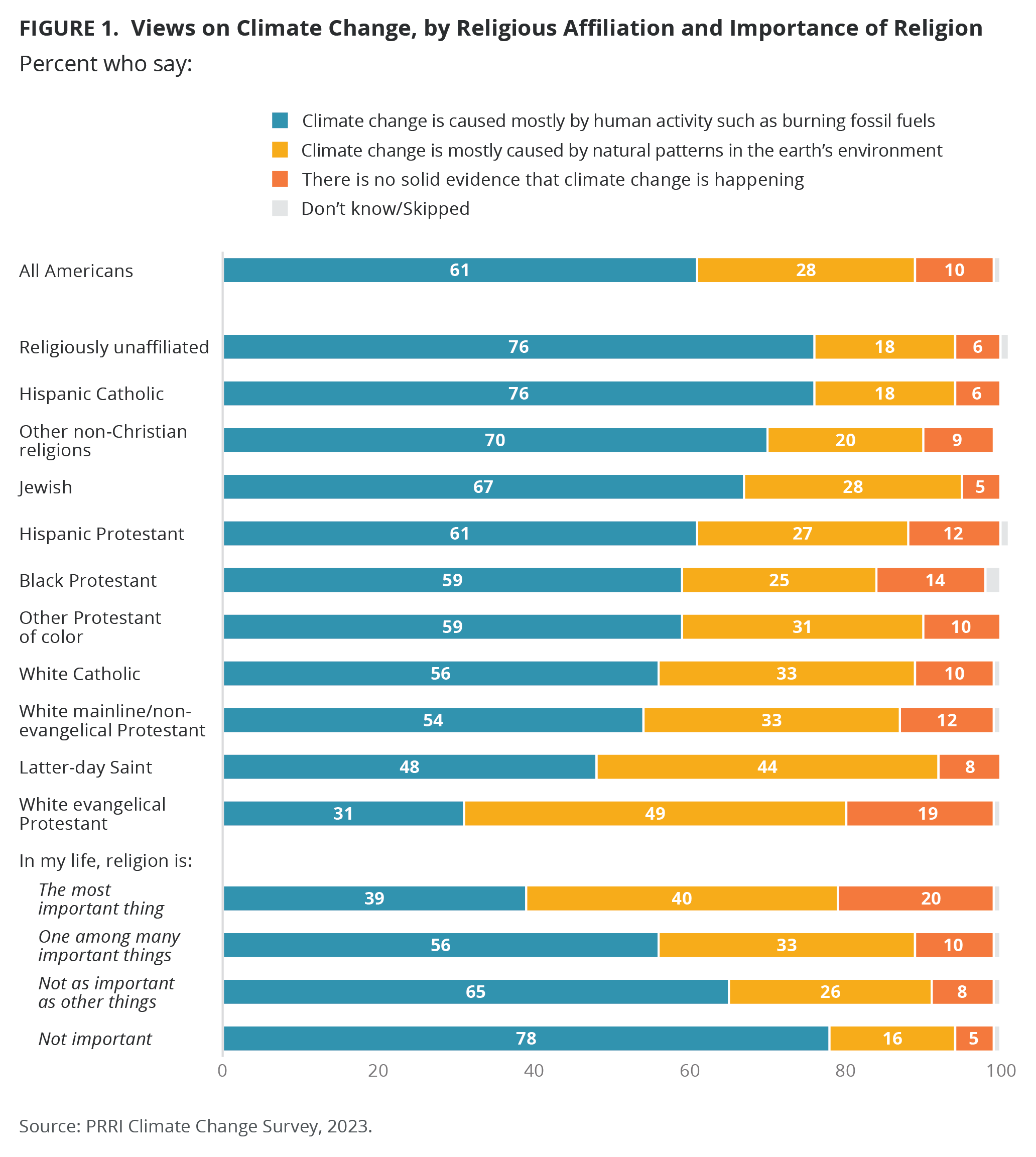
Party Affiliation and Media Trust
More than eight in ten Democrats (83%) say climate change is caused by humans, compared with 64% of independents and 28% of Republicans. Republicans are more likely than independents and Democrats to believe that climate change is naturally caused (50%, 28%, and 12%, respectively). Although most Americans dispute the notion that climate change is naturally occurring, Republicans (20%) are more than twice as likely as independents (8%) and five times as likely as Democrats (4%) to believe that there is no solid evidence of climate change.
More than three-fourths of Americans who most trust mainstream news sources (77%) and the majority of Americans who do not watch TV news (57%) believe that climate change is caused mostly by human activity. In comparison, only three in ten of those who most trust Fox News (29%) and two in ten of those who most trust conservative news sources (20%) say the same. Around half of those who most trust conservative news (51%) and Fox News (50%) say climate change is a natural occurrence. Three in ten of those who do not watch TV news (31%) and less than two in ten of those who trust mainstream news (18%) believe climate change is caused mostly by natural patterns in the earth’s environment. Over one-fourth of conservative news viewers (28%) and two in ten Fox News viewers (19%) believe there is no solid evidence that climate change is happening — more than those Americans who do not watch TV news (11%) and who watch only mainstream news (5%).
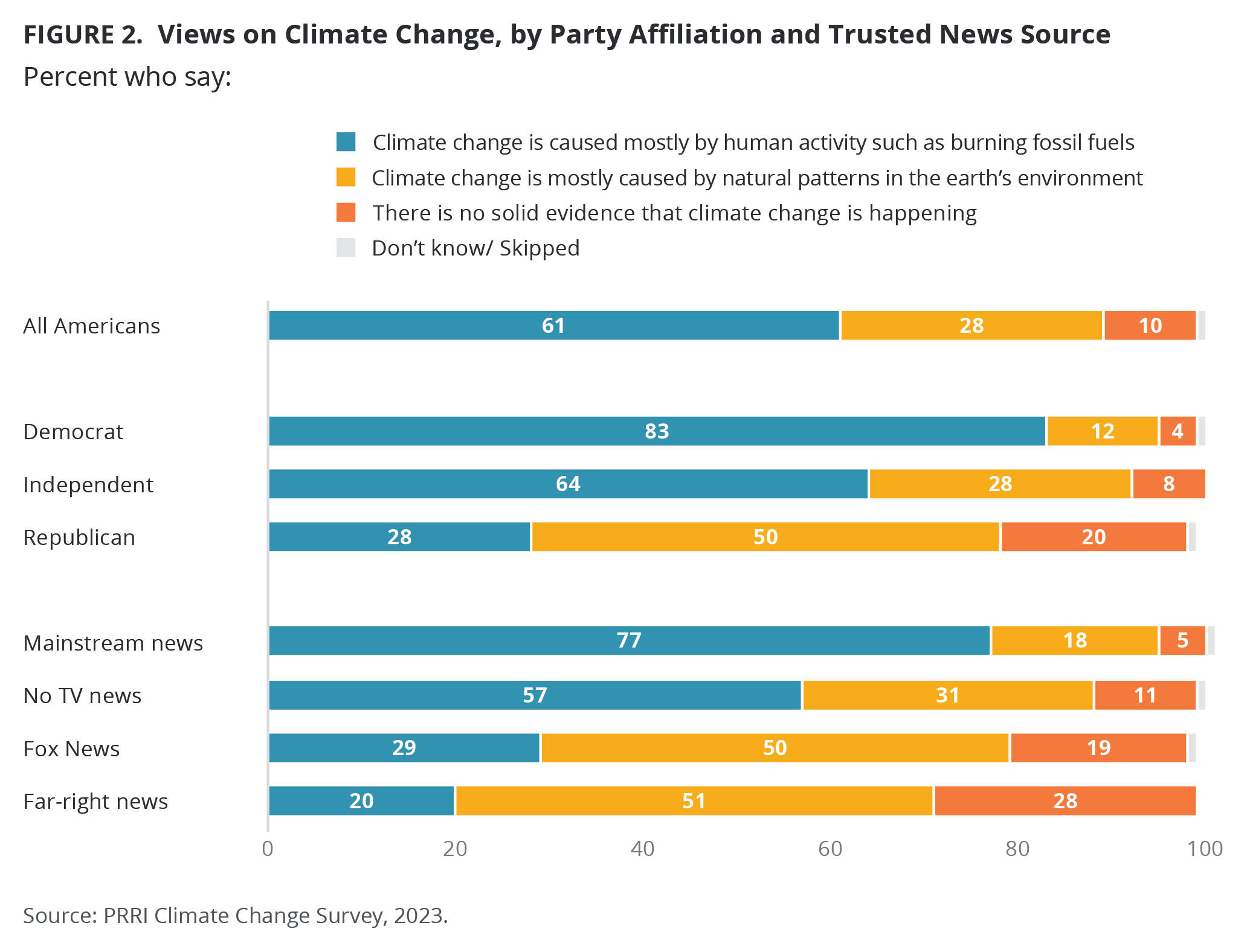
Generation, Race, and Education
Except for the Silent Generation (47%), majorities of each generation say that climate change is caused by human activity: 68% of millennials, 67% of Generation Z, 58% of Generation X, and 55% of baby boomers. The Silent Generation (38%) and baby boomers (35%) are notably more likely than Gen X (29%), millennials (22%), and Gen Z (22%) to believe that climate change is caused by natural patterns in the earth’s environment. About one in ten Americans of each generation do not believe there is evidence of climate change: 13% of the Silent Generation, 12% of Gen X, 10% of Gen Z, 9% of millennials, and 8% of baby boomers.
Attitudes about the causes of climate change are also related to race and ethnicity, with 78% of Asian Americans and Pacific Islanders (AAPI), 73% of Hispanic Americans, and 67% of multiracial Americans believing that climate change is caused by human activities. Smaller majorities of Black and white Americans, 60% and 56%, respectively, say the same. White Americans (33%), however, are notably more likely than Black Americans (24%), multiracial Americans (21%), Hispanic Americans (19%), and AAPI Americans (15%) to say that climate change is caused by natural patterns in the earth’s environment. Around one in ten or less of Black (13%), white (11%), multiracial Americans (11%), Hispanic (7%), and AAPI Americans (5%) believe that there is no solid evidence of climate change.
Over two-thirds of college graduates (68%) and postgraduates (73%) say that the effects of climate change are mostly caused by human activity, compared with slim majorities of Americans with some college (55%) and with a high school diploma or less (56%). By contrast, one-third of Americans with some college (33%), 28% of Americans with a high school education or less, 26% of college graduates, and 22% of postgraduates say that the effects of climate change are caused by natural patterns in the earth’s environment. Americans with a high school diploma or less (14%) and with some college (11%) are more than twice as likely as college graduates (5%) and postgraduates (5%) to believe that there is no solid evidence of climate change.
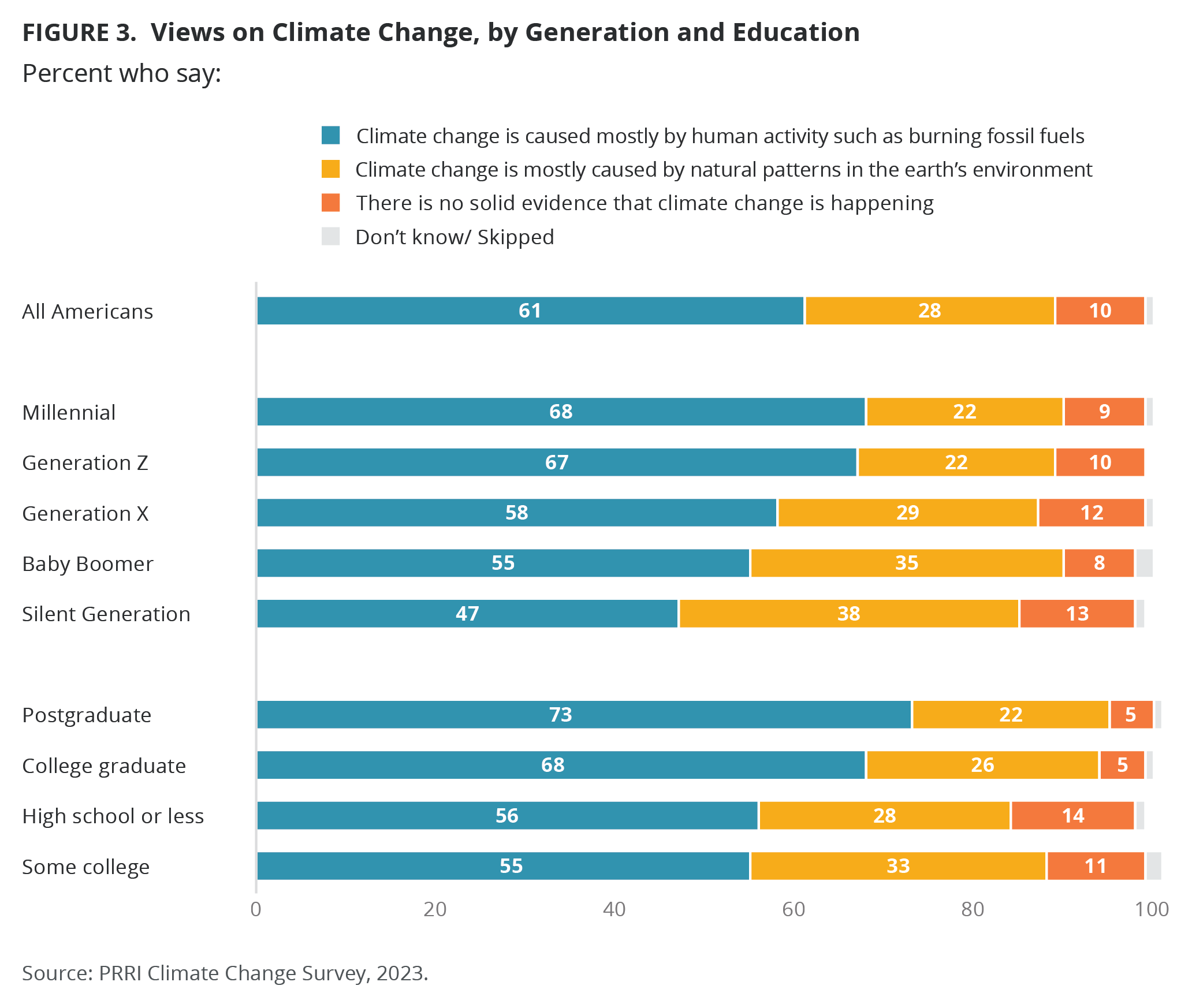
Is Climate Change Indicative of the “End Times?”
Climate Change and the “End of Times”
PRRI’s 2023 Climate Survey finds that 35% of Americans agree that the severity of recent natural disasters is evidence that we are in what the Bible calls “the end of times,” compared with 63% who disagree, including 37% who strongly disagree. In 2014, Americans were evenly divided on this question (49% agree vs. 47% disagree).
Religious Affiliation and Importance of Religion
Substantial majorities of Black Protestants (73%) and white evangelical Protestants (62%, down from 77% in 2014), as well as nearly half of Hispanic Catholics (49%), agree that natural disasters are evidence of the end of times. In comparison, about two in ten or fewer white mainline/non-evangelical Protestants (23%, down from 35% in 2014), white Catholics (21%, slightly down from 26% in 2014), or religiously unaffiliated Americans (13%, significantly down from 29% in 2014) believe that recent natural disasters are evidence of the end of times.[3]
Among Americans who say that religion is the most important thing in their life, 67% agree that natural disasters are evidence of the end of times (75% in 2014), compared with 46% of those who say religion is one among many important things (51% in 2014), 20% who say religion is not as important (27% in 2014), and 12% who say religion is not important (14% in 2014).
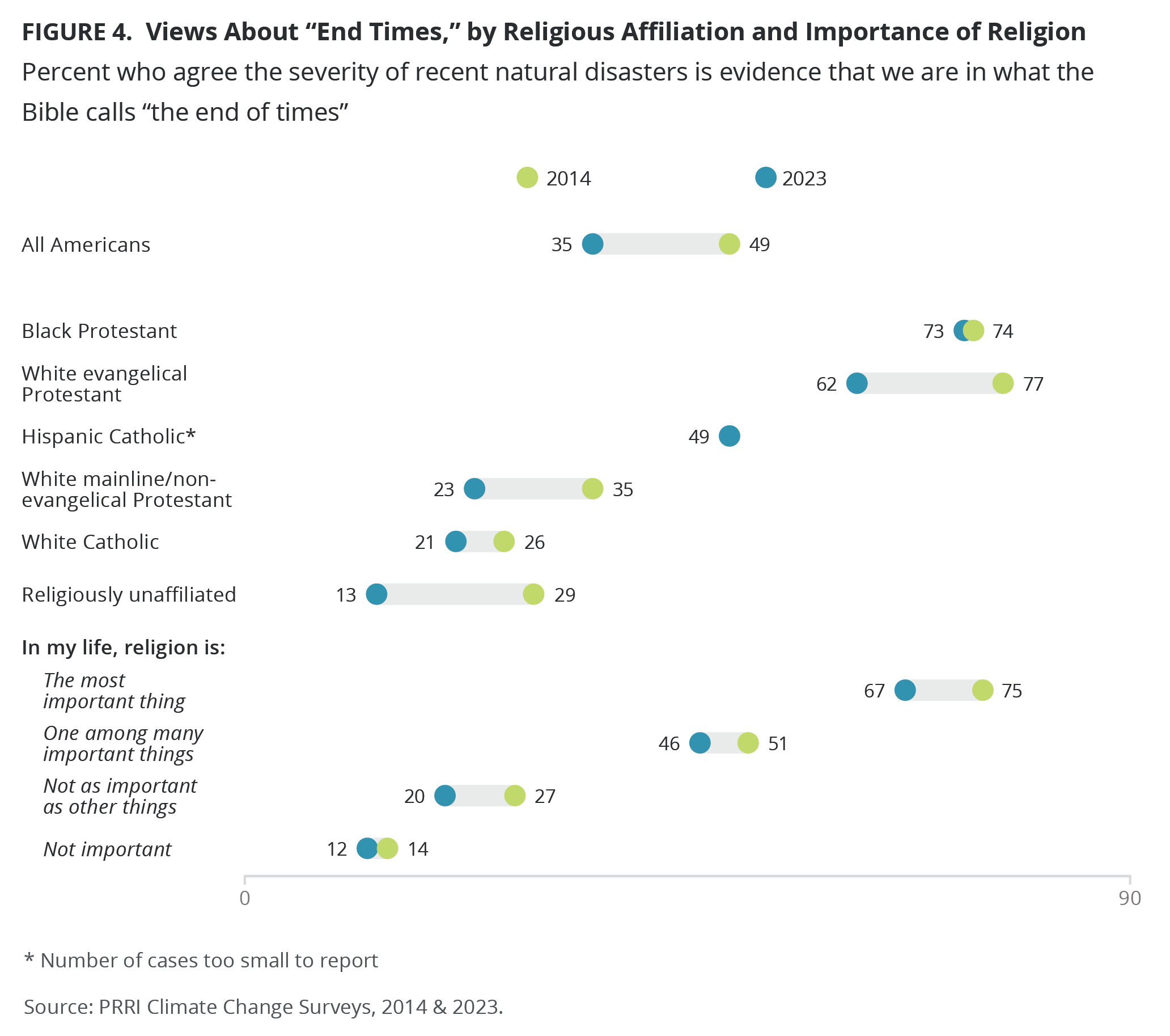
Christian Dominance in Society and Stewardship of the Earth
We also consider whether theological views about Christian dominionism and stewardship are linked to whether Americans believe that the severity of natural disasters is evidence of the end times. Christian dominionism is the idea that God has called Christians to exercise dominion over all areas of society. Environmental stewardship is a theological belief that individuals are required by God to take care of or be good stewards of the Earth.
We find that only about two in ten Americans agree (21%) that God has called Christians to exercise dominion over all areas of society; nearly three in four Americans disagree (74%), including 52% who strongly disagree. White evangelical Protestants (45%) and Hispanic Protestants (44%) are the most likely to agree that God has called Christians to exercise dominion, followed by Black Protestants (38%), and other Protestants of color (38%). About two in ten or fewer white mainline/non-evangelical Protestants (20%), white Catholics (20%), Hispanic Catholics (19%), and Latter-day Saints (19%) also agree. Only about one in ten or less of other non-Christians (12%), Jewish Americans (7%), and religiously unaffiliated Americans (6%) agree.
Americans who say that religion is the most important thing in their lives (46%) are about twice as likely as those who say religion is one among many important things (28%), more than four times as likely as those who say religion is not as important (10%), and about nine times as likely as those who say religion is not important (5%) to say that God has called Christians to exercise dominion over all areas of American society.
When Americans were asked about the importance of living up to our God-given role as stewards to take care of the earth as a reason for protecting the environment, 28% say that it is extremely important, 30% say that it is very important, 20% say it is somewhat important, and 21% say it is not too important (7%) or at all important (14%).
With the exception of other non-Christians (41%), Jewish Americans (34%), and the religiously unaffiliated (33%), the majorities of all other religious groups say that living up to God’s given role as stewards is extremely or very important: 84% of Latter-day Saints, 80% of white evangelical Protestants and Black Protestants, 78% of Hispanic Catholics, 76% of Hispanic Protestants, 73% of other Protestants of color, 63% of white mainline/non-evangelical Protestants, and 56% of white Catholics.
Americans who say that religion is the most important thing in their lives (83%) are notably more likely than those who say religion is one among many important things (74%), those who say religion is not as important (49%), and those who say religion is not important (31%) to say that living up to God’s given role as stewards is extremely or very important as a reason for protecting the environment.
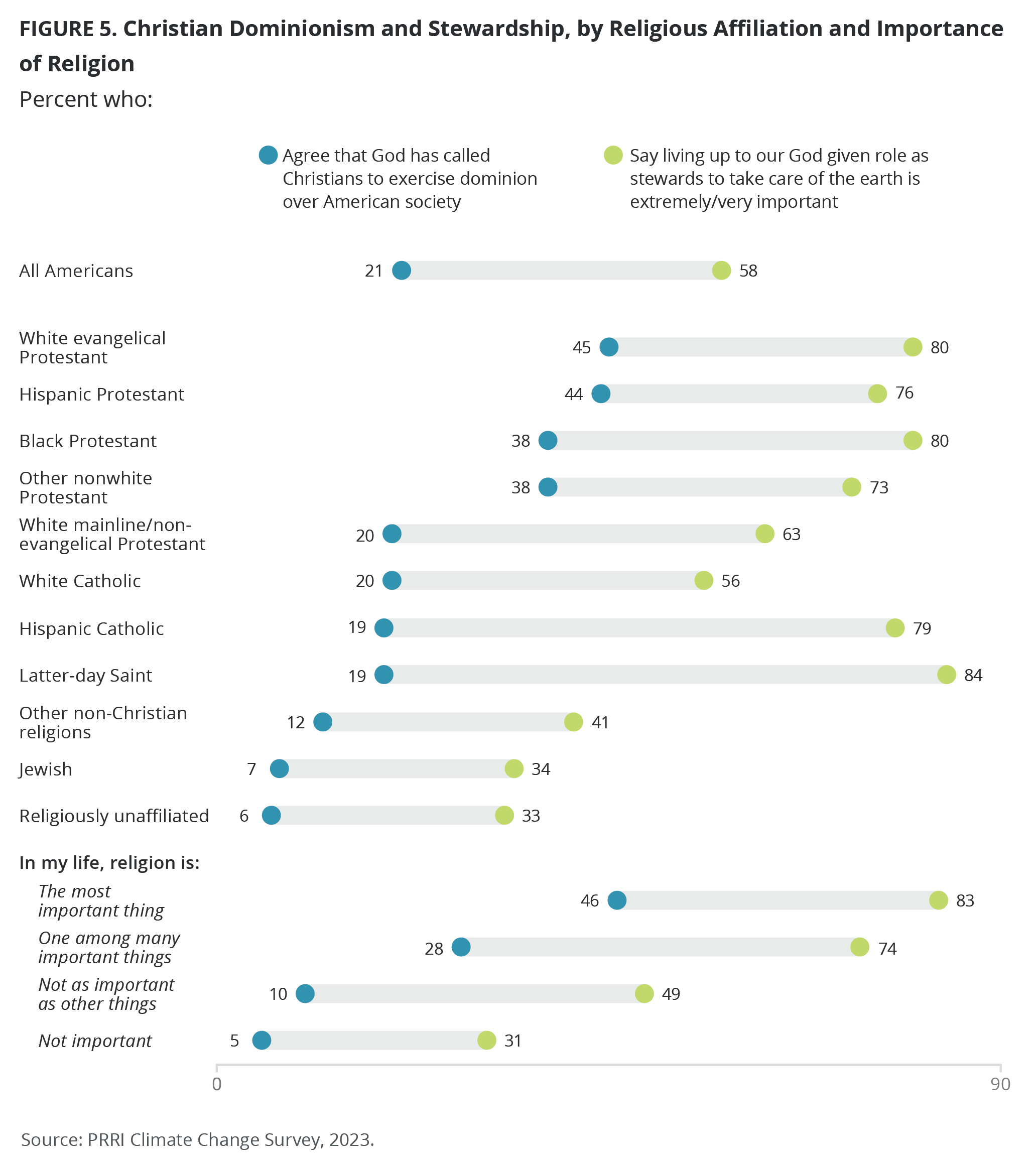
Among Americans who agree that God has called Christians to exercise dominion over all areas of American society, two-thirds (67%) agree that natural disasters are evidence that we are living in the end of times, compared with 25% among those who disagree that God has called Christians to exercise dominion.
Stewardship views are less likely to be linked to viewing natural disasters as signs of the end times. Among those who say that living up to our God-given role as stewards to take care of the earth is extremely or very important as a reason for protecting the environment, 47% agree with the apocalyptic statement, compared with 19% among those who say it is somewhat important, not too important, or not important at all.
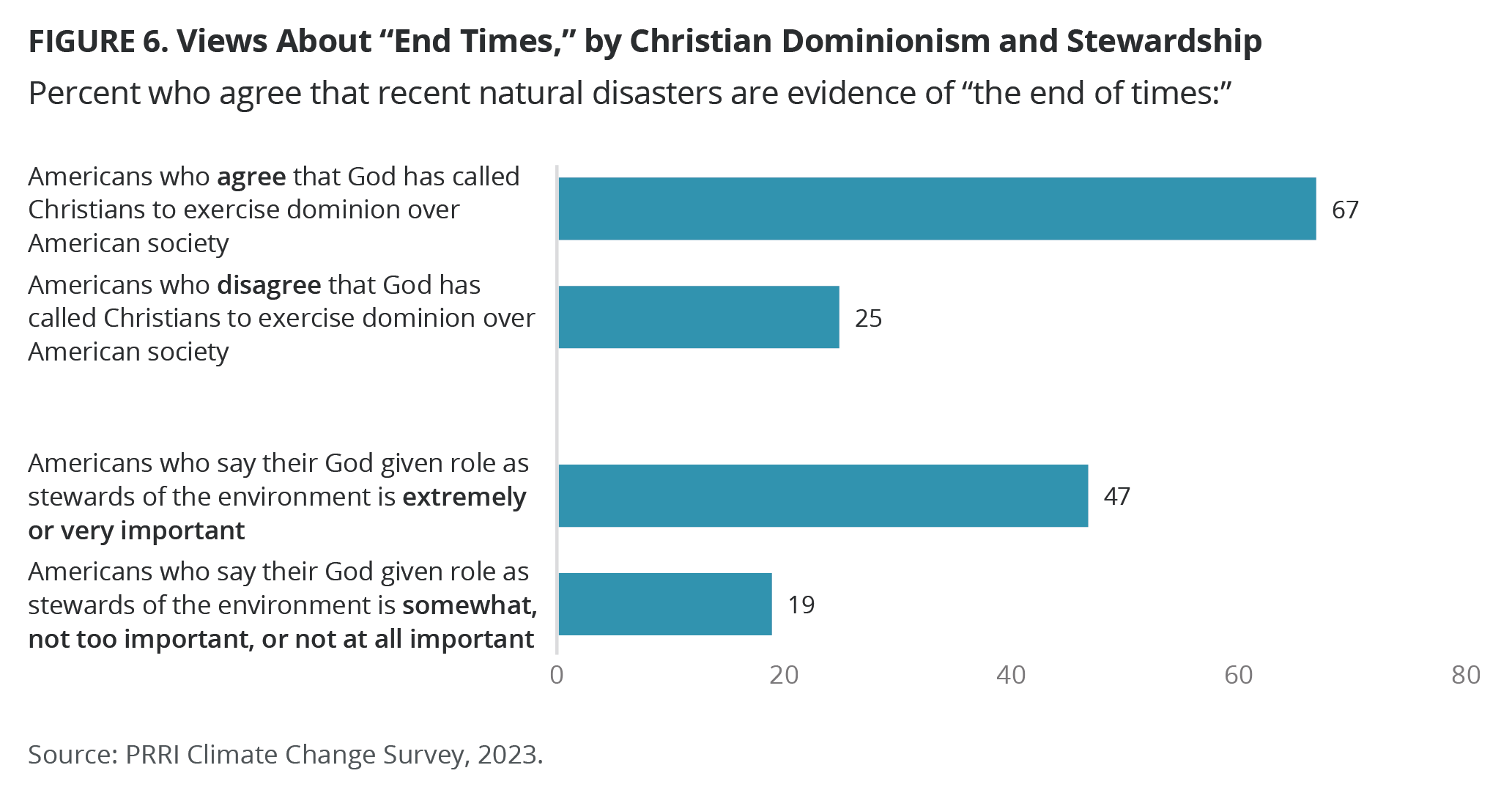
Party Affiliation and Media Trust
Republicans (44%) are more likely than independents (29%) and Democrats (30%) to agree that natural disasters are a sign of the end of times.
Agreement with the severity of natural disasters as evidence of the end of times is greater among Americans who most trust Fox News (52%) or far-right news outlets (43%). Roughly three in ten Americans who most trust mainstream news (35%) and who do not watch TV news (29%) also agree.
Generation, Race, and Education
There are minimal differences across generations in their agreement with the idea that natural disasters are evidence of the end of times. Roughly one-third of Gen Z (38%), millennials (35%), Gen X (36%), baby boomers (34%), and members of the Silent Generation (31%) agree.
Black Americans are the most likely to agree that natural disasters are evidence of the end of times (63%), compared with Hispanic Americans (47%), multiracial Americans (33%), white Americans (26%), and AAPI Americans (23%).
Agreement with the idea that recent natural disasters are evidence of the end of times decreases with higher levels of formal education: 47% of Americans with a high school degree or less, 37% of Americans with some college experience, 25% of college graduates, and 15% of postgraduates. Whites without a college degree are more likely to agree with this statement (35%) than whites with a college degree (13%).
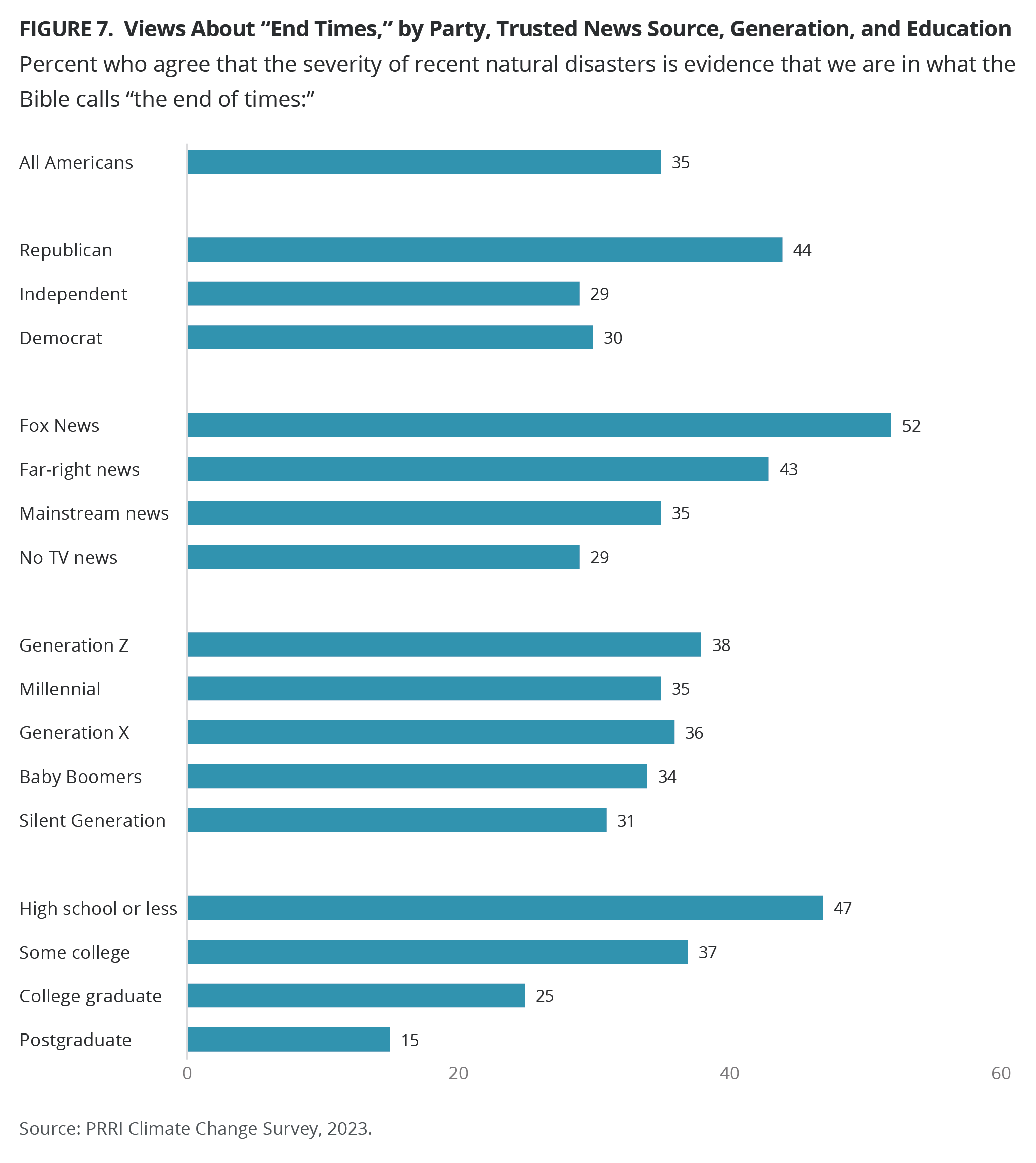
Climate Change and the Will of God
PRRI’s 2023 Climate Survey finds that 28% of Americans agree that God would not allow humans to destroy the earth, compared with 70% who disagree, including 44% who strongly disagree. In 2014, nearly four in ten Americans (39%) agreed with this statement, compared with 53% who disagreed.
Religious Affiliation and Importance of Religious Affiliation
Less than half of all religious groups agree that God would not allow humans to destroy the earth, including 46% of Black Protestants (down from 59% in 2014), 44% of Hispanic Catholics (down from 61% in 2014), 43% of Latter-day Saints, 43% of Hispanic Protestants, 37% of other nonwhite Protestants, and 35% of white evangelical Protestants (down from 45% in 2014). In comparison, about two in four or fewer white Catholics (24%, down from 38% in 2014), Jewish Americans (24%), white mainline/non-evangelical Protestants (22%, down from 36% in 2014), other non-Christians (22%, down from 40% in 2014), and religiously unaffiliated Americans (13%, down from 23% in 2014) agree with the statement that God would not allow humans to destroy the earth.
Among Americans who say that religion is the most important thing in their lives, 46% agree that God would not allow humans to destroy the earth (50% in 2014), compared with 37% of those who say religion is one among many important things (45% in 2014), 20% who say religion is not as important (32% in 2014), and 11% who say religion is not important (13% in 2014).
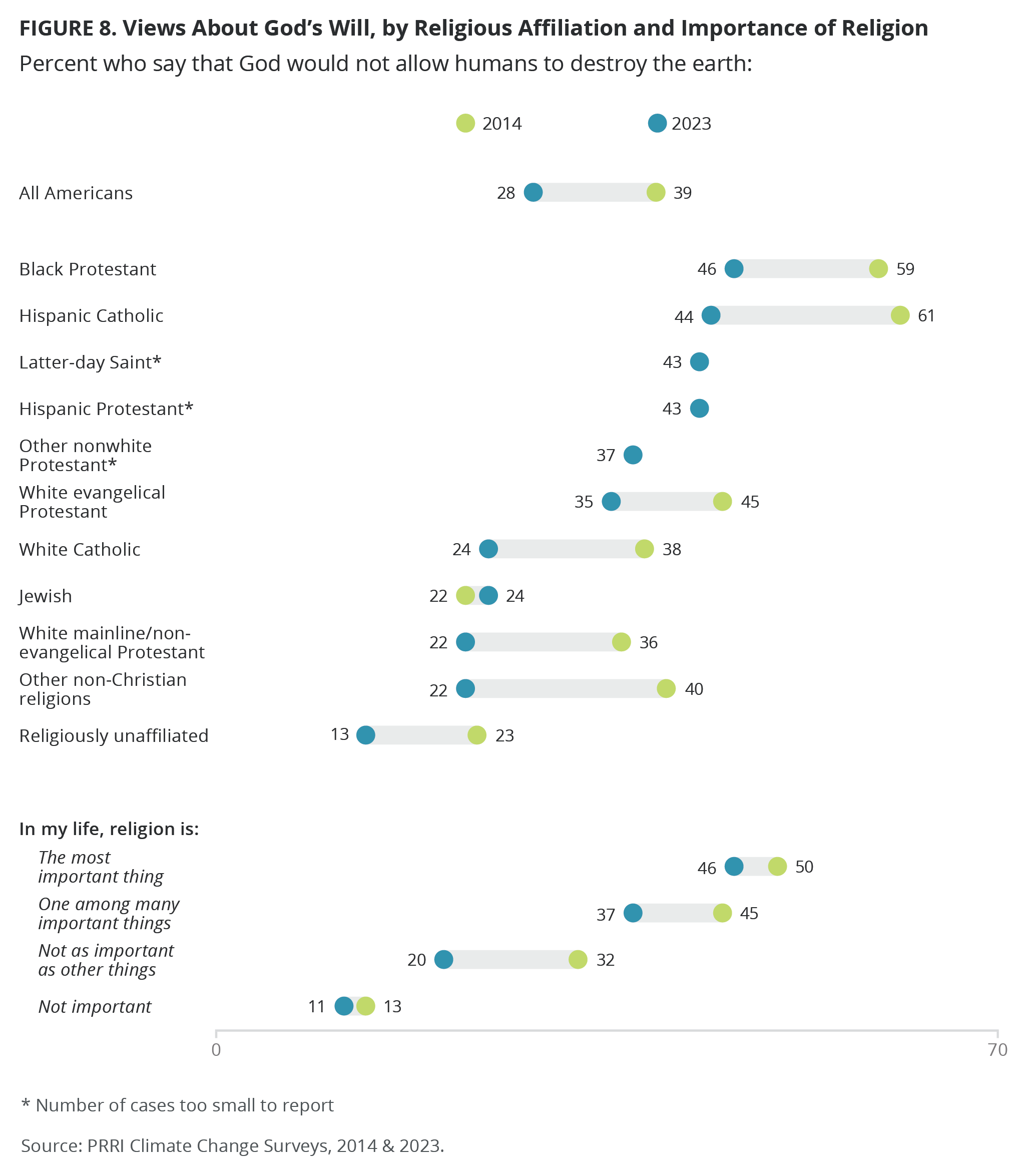
Among Americans who agree that God has called Christians to exercise dominion over all areas of American society, 51% agree that God would not allow humans to destroy the earth, compared with 22% among those who disagree that God has called Christians to exercise dominion over all areas of American society.
Among those who say that living up to our God-given role as stewards to take care of the earth is an extremely or very important reason for protecting the environment, 35% agree that God would not allow humans to destroy the earth, compared with 18% among those who say it is somewhat important, not too important, or not important at all.
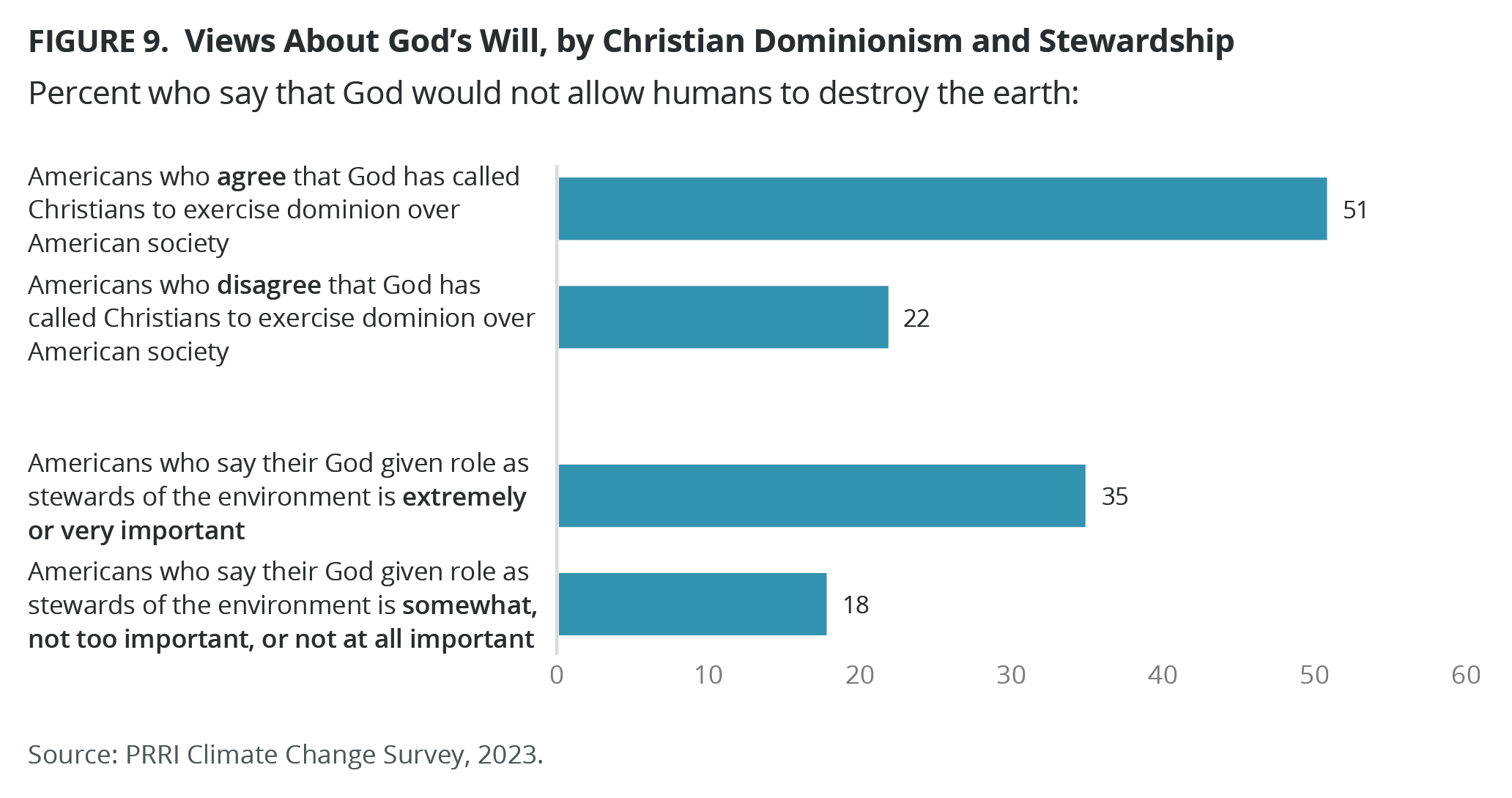
Party Affiliation and Media Trust
Republicans (35%) are more likely than independents (26%) and Democrats (22%) to agree that God would not allow humans to destroy the earth.
Agreement with the idea that God would not allow humans to destroy the earth is greater among Americans who most trust Fox News (36%) or far-right news outlets (42%). Roughly three in ten or less Americans who most trust mainstream news (28%) and who do not watch TV news (24%) agree with both statements.
Generation, Race, and Education
The Silent Generation (38%) is more likely than younger generations — including 29% of baby boomers, 27% of Gen X, 25% of millennials, and 31% of Gen Z — to agree that God would not allow humans to destroy the earth.
Black Americans (45%) are the most likely to agree that God would not allow humans to destroy the earth, compared with 38% of Hispanic Americans, 25% of multiracial Americans, 22% of white Americans, and 20% of AAPI Americans.
Agreement with the idea that God would not allow humans to destroy the earth decreases with higher levels of education: 37% of those with a high school degree or less, 29% of those with some college experience, 18% of college graduates, and 15% of postgraduates. Whites without a college degree are more likely to agree with the statement than whites with a college degree (28% vs. 14%).
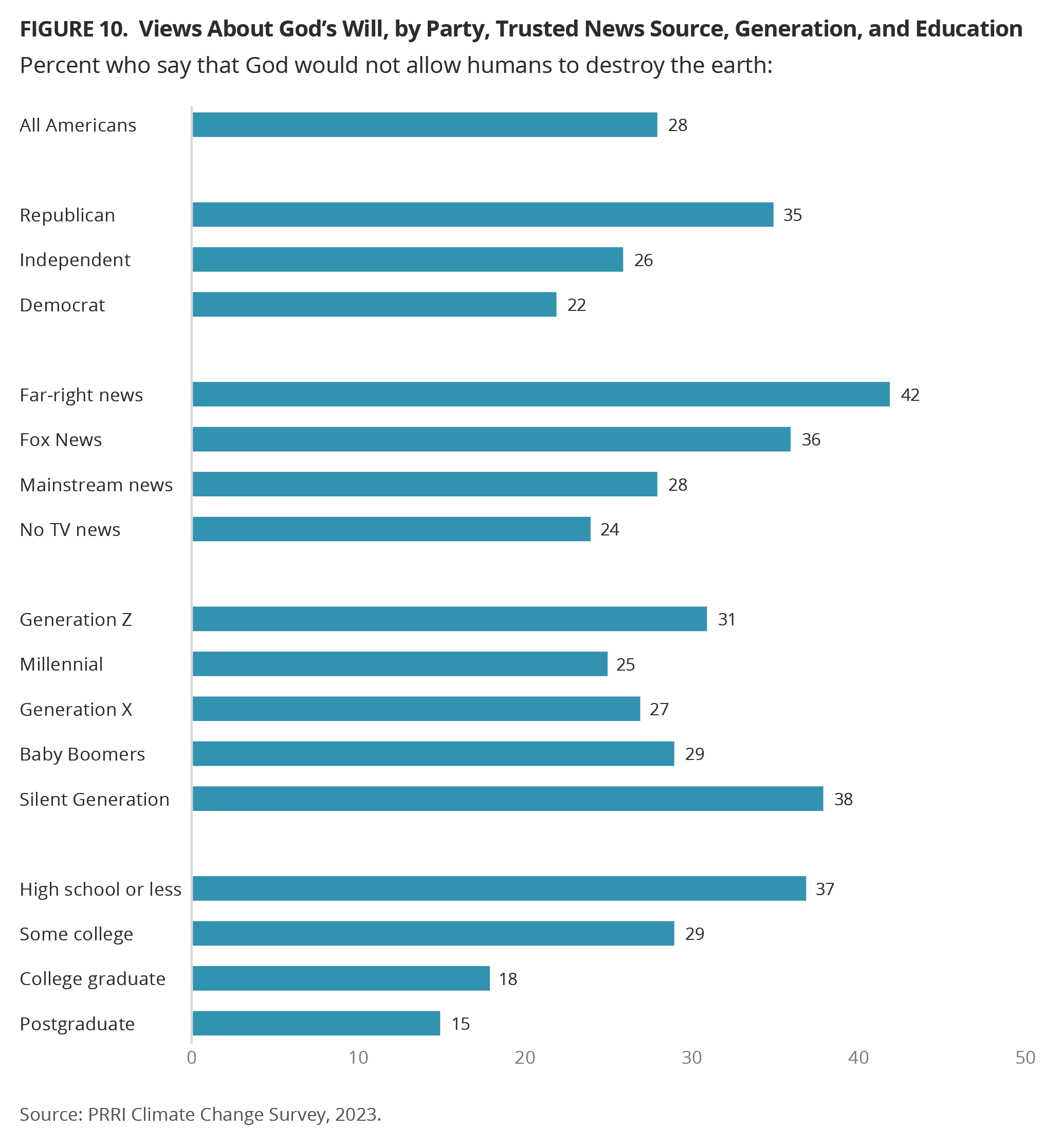
Spiritual Connections to the Earth
More Americans than not (52% vs. 45%) agree with the statement “Most days, I feel a deep spiritual connection with nature and the earth.”
Religious Affiliation
With the exception of Jewish (42%) and unaffiliated Americans (46%), at least half of members of all other religious groups say they feel a deep spiritual connection with nature and the earth. Nearly three in four Latter-day Saints (73%) and six in ten members of other non-Christian religions (61%), Hispanic Catholics (60%), white mainline/non-evangelical Protestants (58%), and Black Protestants (56%) also agree. Around half of white evangelical Protestants (54%), Hispanic Protestants (53%), white Catholics (51%), and other protestants of color (48%) say they feel a deep spiritual connection with nature and the earth.
Among Americans who say that religion is the most important thing or among many important things in their lives, 55% agree that they feel a deep spiritual connection with nature and the earth, compared with 61% among those who say that religion is one of the most important things, 48% who say religion is not as important, and 43% who say religion is not important in their lives.
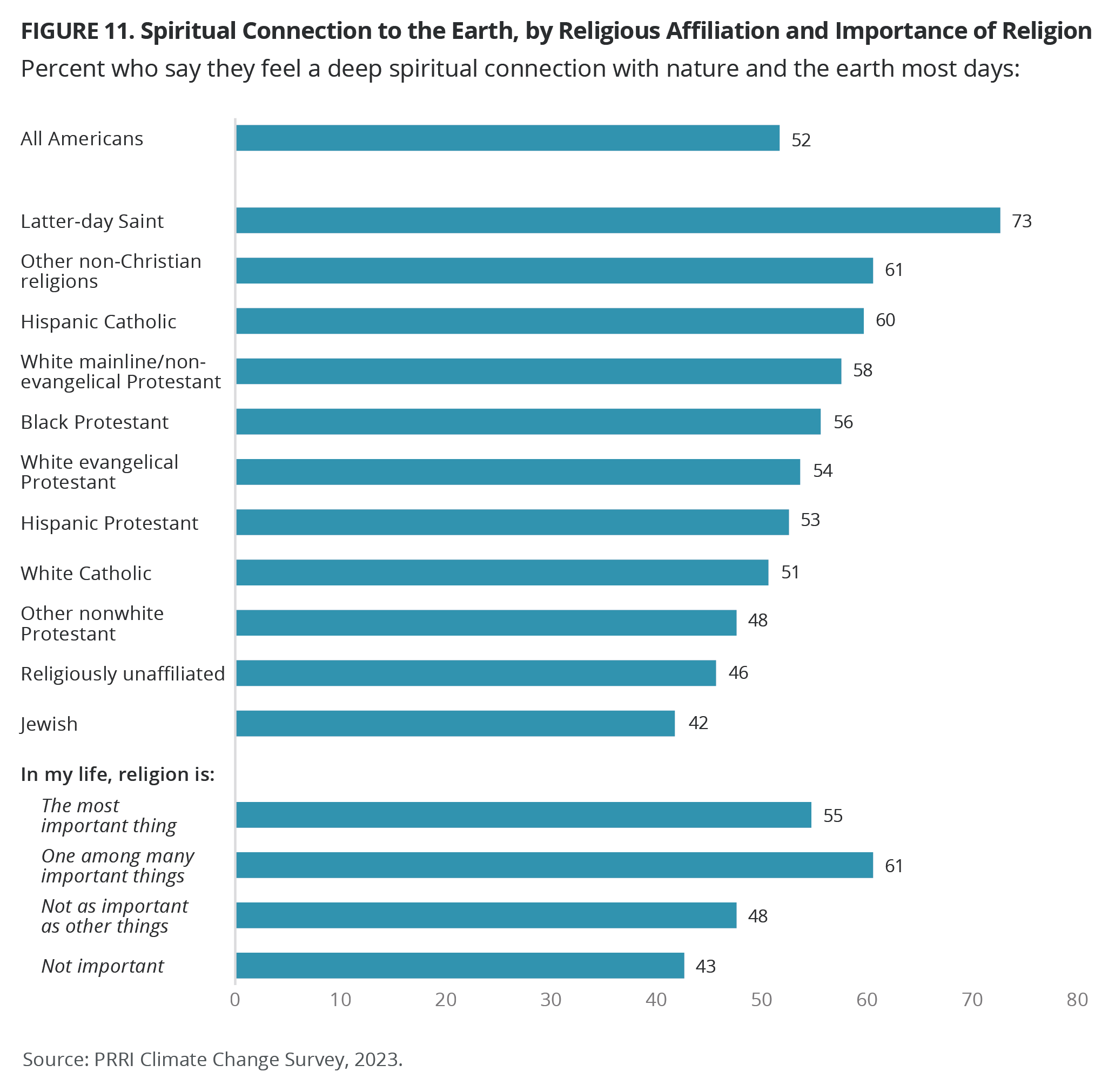
Among Americans who agree that God has called Christians to exercise dominion over all areas of American society, 61% agree that most days they feel a deep spiritual connection with nature and the earth, compared with 51% among those who disagree that God has called Christians to exercise dominion over all areas of American society.
Among those who say that living up to our God-given role as stewards to take care of the earth is extremely or very important as a reason for protecting the environment, 60% agree that they feel a deep spiritual connection with nature and the earth, compared with 40% among those who say it is somewhat important, not too important, or not important at all.
Party Affiliation and Media Trust
There are no differences by partisanship in agreement with feeling a strong spiritual connection to the earth: 51% of Republicans, 51% of Democrats, and 53% of independents agree.
Similarly, there are minimal differences between Americans across which media outlets they most trust. Roughly half of Americans who do not watch TV news (50%), and most who trust far-right news outlets (50%), Fox News (52%), or mainstream TV news (55%) agree that most days they feel a spiritual connection with the earth.
Generation, Race, and Education
The Silent Generation (64%) and baby boomers (61%) are more likely than Gen X (52%), millennials (44%), and Gen Z (48%) to say they feel a deep spiritual connection with nature and the earth. Women (57%) are more likely than men (47%) to say they feel spiritually connected to the earth, but this is especially the case among women who belong to the Silent Generation (74%), baby boomer women (65%), and Gen X women (59%). By contrast, millennial men (39%) and Gen X men (44%) are the least likely to agree with this statement.
AAPI Americans (40%) are notably less likely than white Americans (52%), multiracial Americans (53%), Black Americans (54%), and Hispanic Americans (57%) to agree that they feel a deep spiritual connection with nature and earth.
Americans with a high school education (56%) are slightly more likely than those with a college degree (47%) and a postgraduate degree (50%) to say they feel a deep spiritual connection with nature and the earth, but do not differ from Americans with some college education (53%). The majority of whites without a college degree (54%) say they feel deeply connected to the earth, compared with 48% of whites with a college degree.
Effects of Climate Change and Vote Choice
Is Climate Change a Crisis?
Americans’ views on the urgency of climate change have remained about the same over the past decade. A little over one-quarter of Americans (27%) say that climate change is a crisis, just a few percentage points up from 23% in 2014.
Religious Affiliation
With the exception of religiously unaffiliated and white evangelical Protestants, beliefs on the severity of climate change have not shifted significantly among religious traditions. About three in ten Jewish Americans (32%), Hispanic Catholics (31%), and other Protestants of color (27%) as well as about two in ten white mainline/non-evangelical Protestants (22%), white Catholics (20%), Black Protestants (19%), and Hispanic Protestants (16%) view climate change as a crisis. Just one in ten Latter-day Saints (10%) believe the same. Among religiously unaffiliated Americans, the belief that climate change is best described as a crisis increased by ten percentage points, from 33% in 2014 to 43% in 2023. By contrast, among white evangelical Protestants, agreement with this belief went down from 13% to 8% during same period.
Among Americans who say that religion is the most important thing or among many important things in their lives, just 13% say climate change is a crisis (18% in 2014), compared with 20% among those who say that religion is one of the most important things, 27% who say religion is not as important (32% in 2014), and 45% who say religion is not important in their lives (33% in 2014).
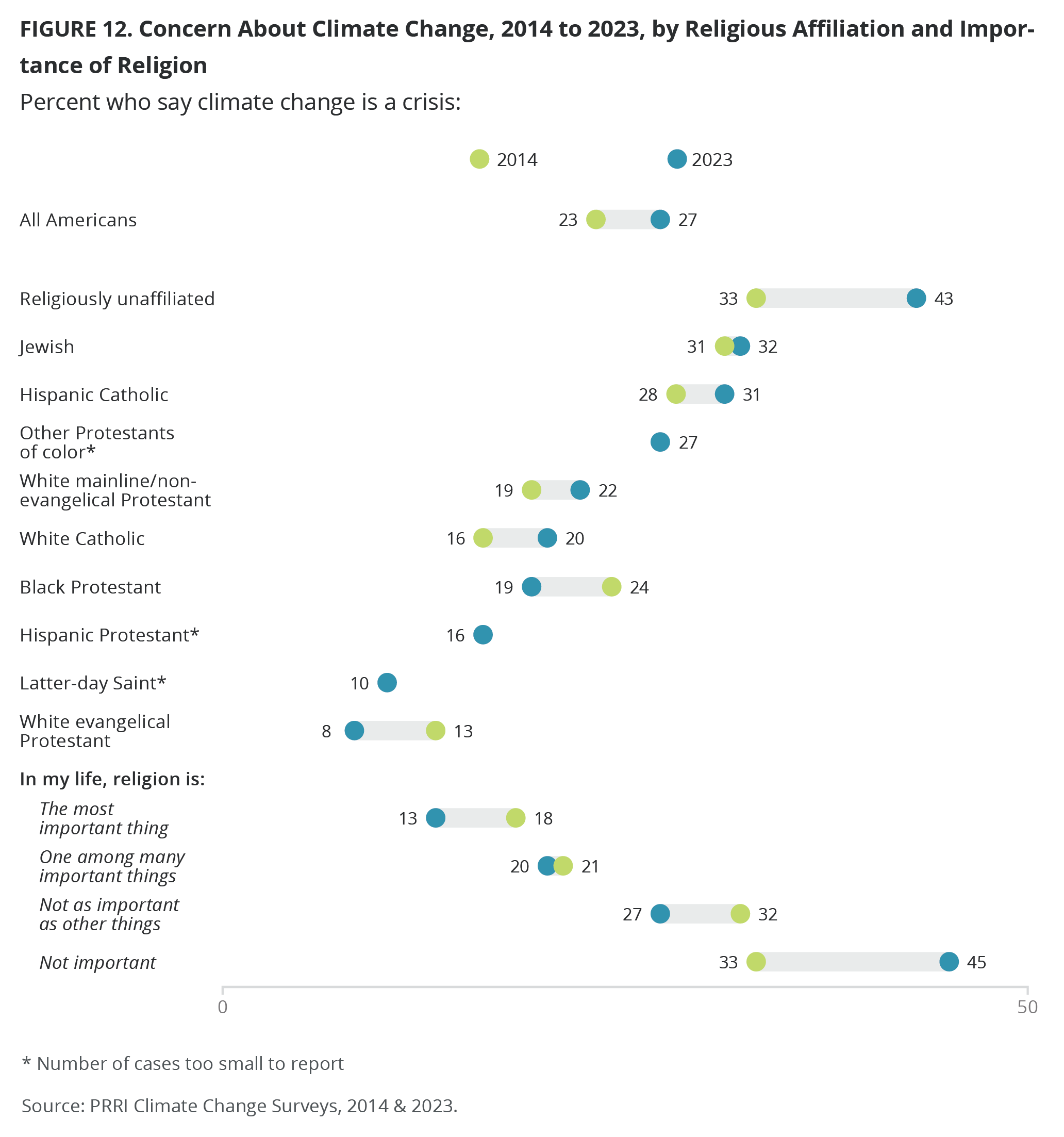
Party Affiliation
The belief among Republicans that climate change is a crisis dropped to 6% from 12% in 2014. By contrast, the belief that climate change is a crisis among Democrats increased by ten percentage points over the past decade, from 34% in 2014 to 44% in 2023. Among independents, the belief that climate change is a crisis shifted slightly from 21% in 2014 to 25% in 2023.
Generation, Race, and Education and Media Trust
Younger generations are much more likely to see climate change as a crisis. Roughly one-third of Gen Z (34%) and millennials (32%) see climate change as a crisis, compared with around two in ten members of Gen X (23%), baby boomers (23%), or the Silent Generation (17%).
Over one-third of AAPI Americans (35%), three in ten multiracial Americans (30%) and Hispanic Americans (29%), and about one in four white Americans (25%) and Black Americans (24%) view climate change as a crisis.
Americans with a high school diploma or less formal education (22%) and those with some college experience (23%) are less likely than Americans with a college degree (34%) and a postgraduate degree (36%) to say that climate change is a crisis. Further, Americans with college or postgraduate degrees have grown more likely to view climate change as a crisis over the past decade — 25% and 31%, respectively, in 2014. About one-third of white college graduates (34%) and two in ten white non-college graduates (20%) believe that climate change is a crisis.
Over one-third of Americans who trust mainstream news sources the most (35%) believe that climate change is a crisis, along with nearly one-quarter of those who do not watch TV news sources (24%). In comparison, fewer than one in ten Americans who most trust Fox News (9%) or far-right news outlets (4%) say that climate change is a crisis.
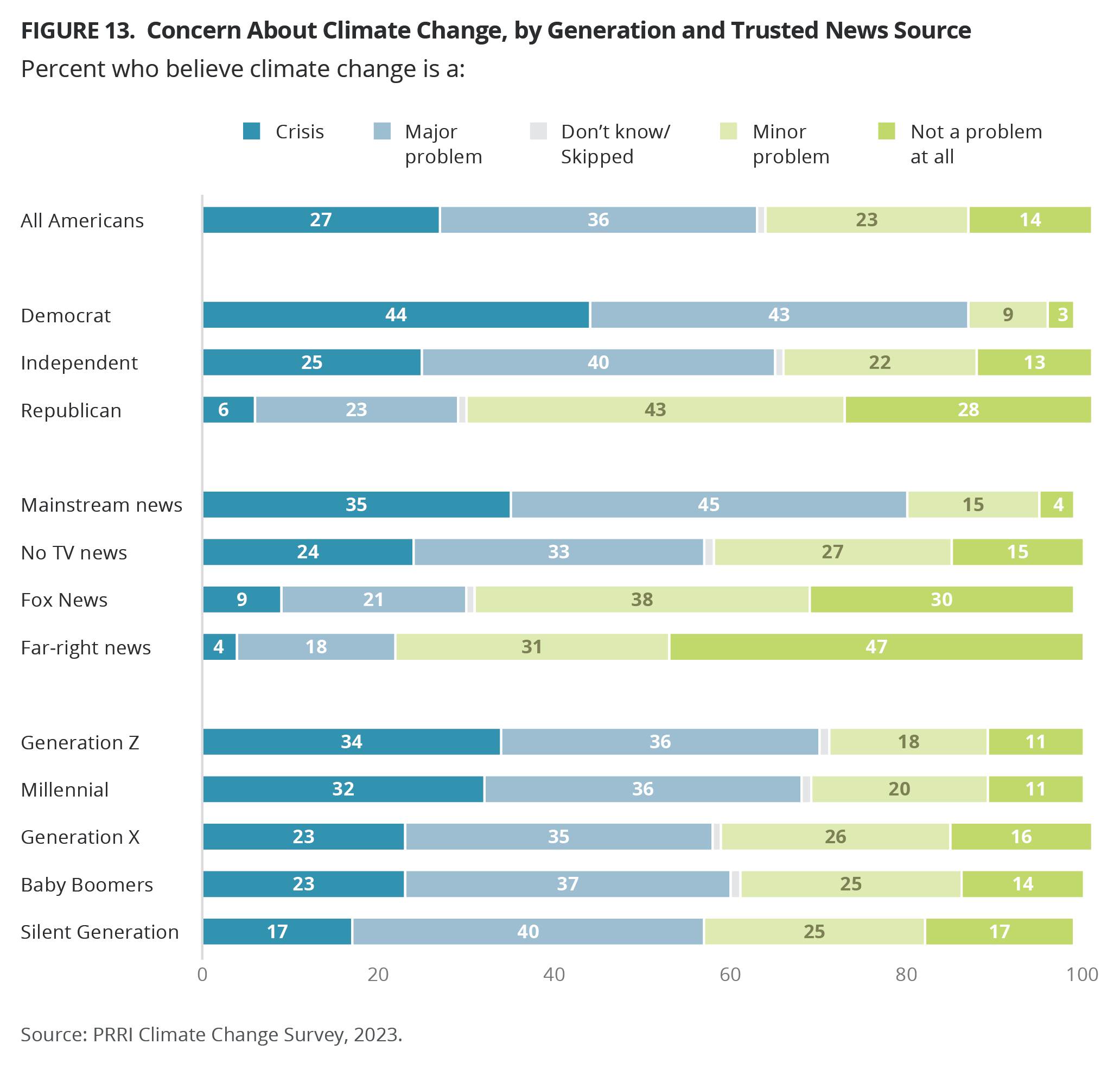
Views of Climate Change and Vote Choice
Looking at climate change as an issue that people consider when voting, nearly three in ten Americans (29%) say they will only vote for a candidate who shares their views on climate change. Around half of Americans (48%) will consider a candidate’s position on climate change as just one of many important factors when voting. More than two in ten Americans (22%) do not see climate change as a major issue when voting for a candidate in an election.
Religious Affiliation
Nearly four in ten religiously unaffiliated Americans (39%) say they will only vote for a candidate with shared views on climate change. Around three in ten Jewish Americans (31%), Hispanic Catholics (29%), and white mainline/non-evangelical Protestants (28%), and around one-quarter of Hispanic Protestants (26%), white evangelical Protestants (24%), and white Catholics (22%) say they will only vote for a candidate who shares their climate change stance. Less than two in ten Black Protestants (18%) and Latter-day Saints (15%) would vote for a candidate solely based on their position on climate change.
Among Americans who say that religion is the most important thing or among many important things in their lives, 25% say they will only vote for a candidate based on their views on climate change, compared with 23% among those who say that religion is one of the most important things, 27% who say religion is not as important (32% in 2014); and 41% who say religion is not important in their lives (33% in 2014).
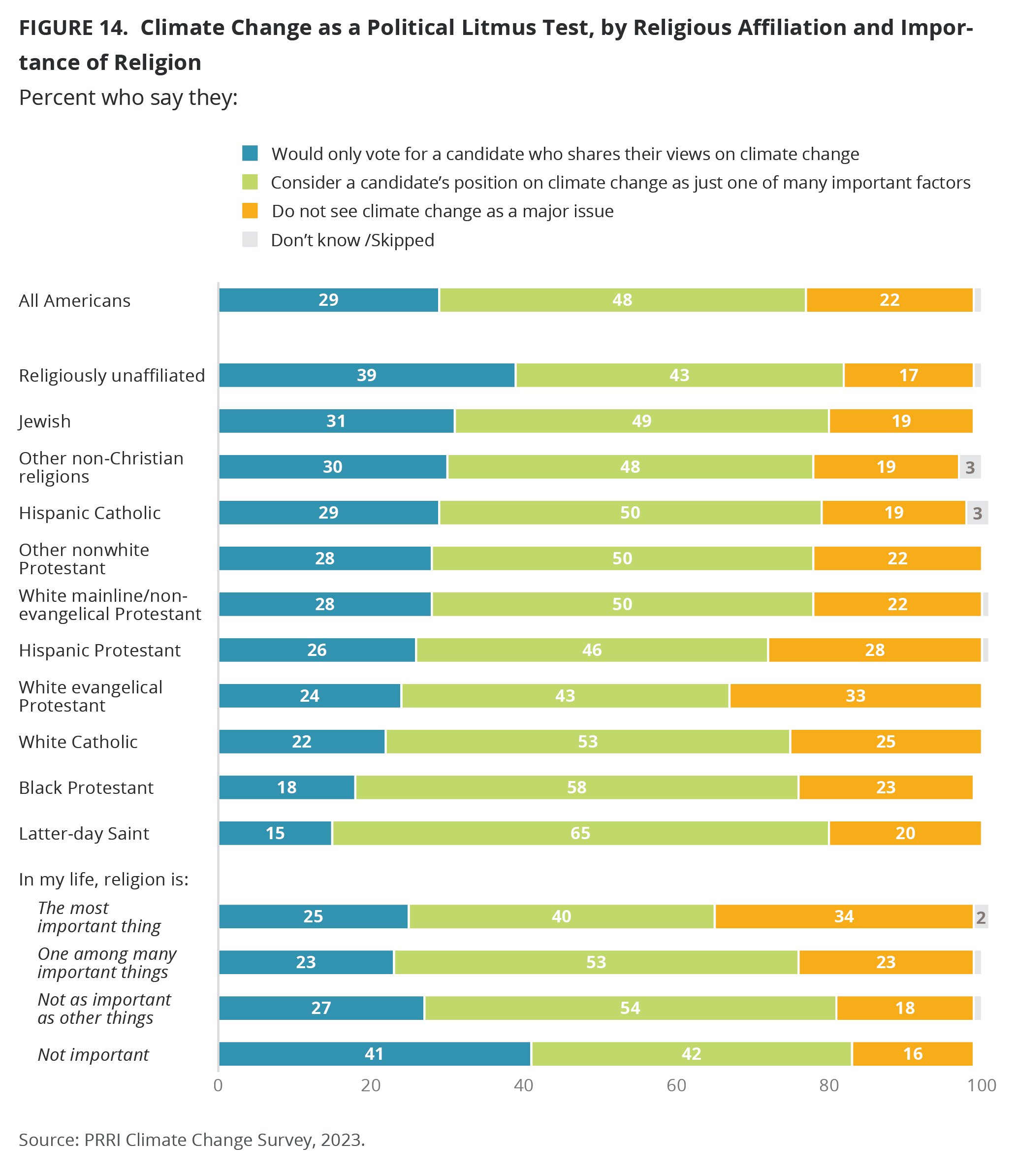
Party Affiliation and Media Trust
Republicans (21%) and independents (26%) are less likely than Democrats (39%) to only vote for a candidate based off their stance on climate change. Republicans (38%) are almost twice as likely as independents (21%) and nearly four times as likely as Democrats (10%) to say that climate change is not a major issue for voting.
There are only small differences between Americans who most trust mainstream news sources and those who trust Fox News or far-right outlets. Around one-quarter of Americans who most trust conservative news (25%), Fox News (26%), no TV news (29%), and mainstream news (29%) say they will only vote for a candidate that shares their views on climate change.
Generation, Race, and Education
Across generational lines, Americans are roughly similarly likely to say that a candidate must share their views on climate change. Around three in ten millennials (30%), members of Gen Z (32%), or the Silent Generation (32%) say that candidates must share their views on climate change. Baby boomers (28%) and members of Gen X (25%) are marginally less likely to say the same.
Black (19%) and multiracial (25%) Americans are slightly less likely than white (30%), Hispanic (31%), and AAPI Americans (32%) to say that a candidate must share their views on climate change to earn their vote.
Around one-third of Americans with a four-year college degree (31%) or postgraduate degree (34%), compared with slightly fewer Americans with some college experience (27%) or with a high school degree or less (26%), say that they will only support a candidate who shares their views on climate change. White college graduates (34%) are more likely than white non-college graduates (28%) to take a candidate’s view on climate change into consideration when voting.
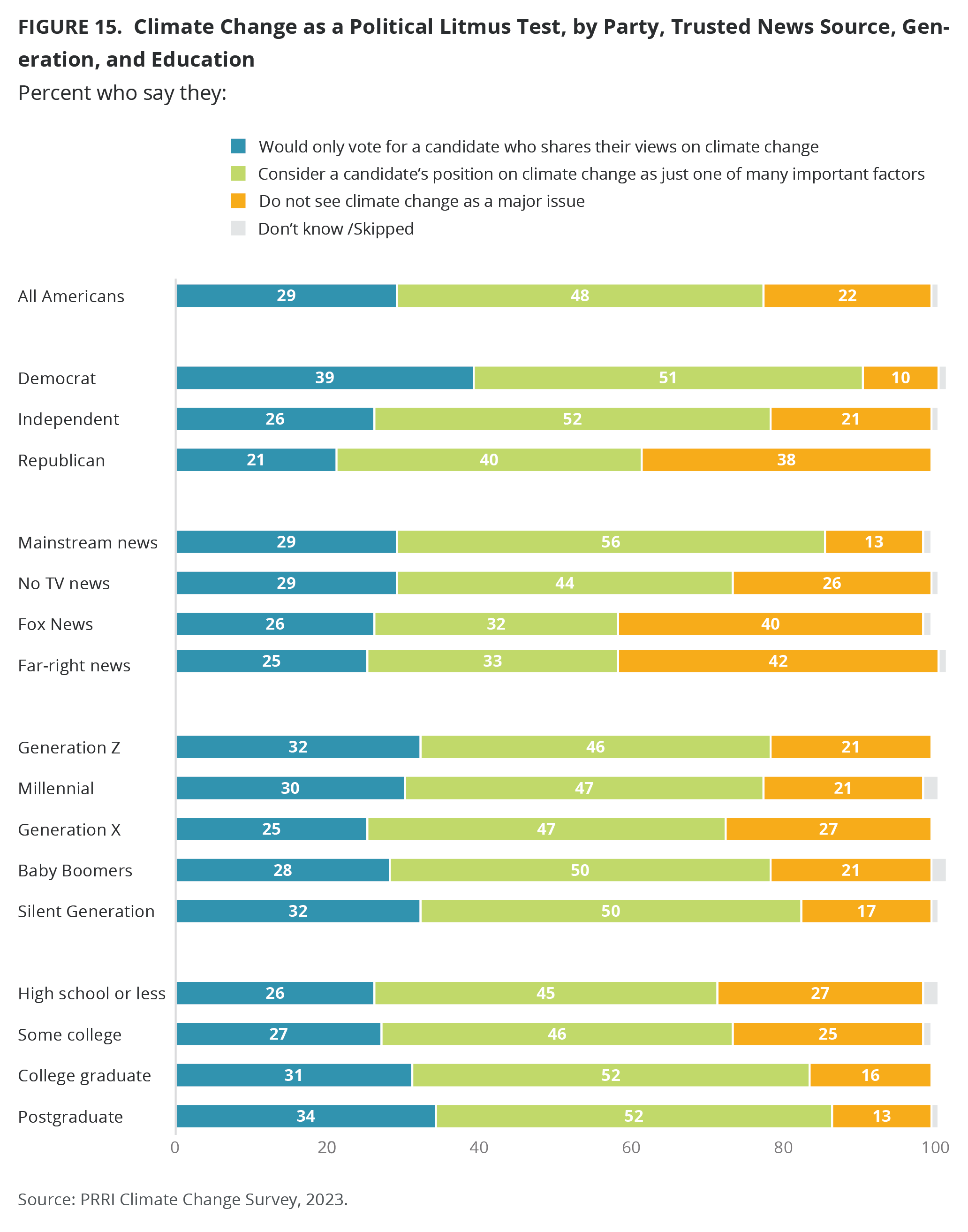
Why Should Americans Protect the Environment?
Reasons to Protect the Environment
PRRI asked Americans to rank the importance of various reasons for protecting the environment. Messages that emphasize human responsibilities and preventing harm are extremely or very important to around eight in ten Americans. Approximately eight in ten Americans say that preventing human suffering (80%), living up to our responsibility to protect future generations (78%), or respecting and taking care of the earth (78%) are important reasons for protecting the environment. Additionally, around seven in ten Americans think it is important to live up to our responsibility to protect other species (70%) or know that some environmental damage can never be undone (68%).
Religious Affiliation
There are few major differences across religious groups in their views of the importance of various reasons to protect the environment. Majorities of all religious groups say that each reason is important. However, Hispanic Catholics are most likely to find these reasons compelling, with around eight in ten or more members of this group reporting each reason as important. While Black Protestants followed a similar trend, smaller shares of this group found knowing that some environmental damage can never be undone (68%) and living up to our responsibility to protect other species (67%) to be important. The vast majority of white evangelical Protestants also find preventing human suffering and harm (80%) as important reasons to protect the environment.
Other religious groups follow similar patterns: around eight in ten or more members of all religious groups say preventing human harm and suffering is an important reason to protect the environment.
Party and Media Trust
Majorities of Americans across the partisan spectrum say that each of these reasons to protect the environment are important. Democrats are significantly more likely than Republicans to rate nearly all these reasons as important. Independents generally express views similar to those of all Americans.
A majority of Americans, regardless of media trust, say that all of these reasons are important. However, the one exception is that only 45% of those who most trust far-right media report knowing that some environmental damage cannot be undone as important. Additionally, those who most trust mainstream news or do not watch TV news are more likely than those who trust Fox News or conservative outlets to find these reasons important.
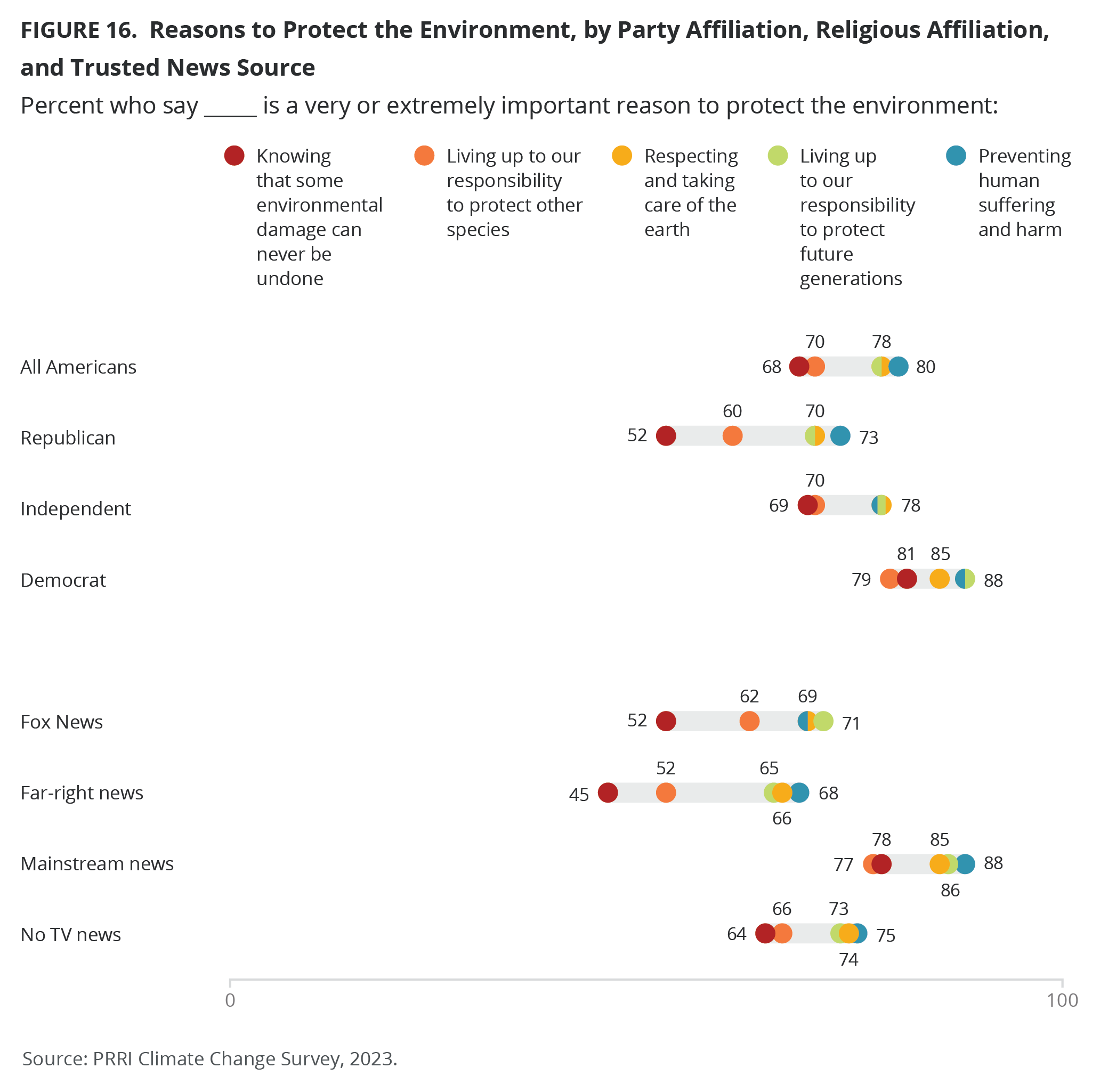
Generation and Race
Solid majorities across all generations agree with the importance of different reasons for protecting the environment.
Differences across racial groups on the importance of different reasons for protecting the environment are relatively small. Hispanic Americans are generally most likely to agree that these reasons to protect the environment are important, with around eight in ten or more saying that each reason is compelling.
Around two-thirds or more of Black Americans find all these statements compelling, with around eight in ten saying that preventing human suffering and harm (83%), living up to our responsibility to protect future generations (80%), or respecting and taking care of the earth (78%) are important.
Around three-quarters of AAPIs and multiracial Americans find each of the reasons to protect the environment important, though slightly fewer AAPIs say that protecting other species is important (65%).
Although around two-thirds or more white Americans say each of these statements are important, they are less likely than other racial groups to find these reasons important.
Actions to Prevent Climate Change
What Climate Policies Do Americans Support the Most?
Most Americans are generally supportive of a variety of policies to fight climate change, even when asked to consider likely increased costs or taxes. While these policies win support from majorities of Democrats and independents, Republicans lean toward opposing most policies.
One policy wins broad bipartisan support: 77% of Americans support providing tax breaks for individuals who adopt renewable energy sources to power their home, including 60% of Republicans, 78% of independents, and 89% of Democrats.
Around two-thirds of Americans (66%) support imposing stricter limits on the amount of carbon dioxide that power plants and other industrial facilities can release, even if it raises the prices of goods and services. Partisan divides increase on this question: 43% of Republicans would favor this policy, compared with 66% of independents and 86% of Democrats.
Around six in ten Americans support increasing federal funding for research on renewable energy such as wind, solar, and hydrogen, even if it raises taxes (62%), or imposing stricter limits on the amount of carbon dioxide that vehicles produce, even if it raises the price of cars (58%). Roughly one-third of Republicans support these policies (36% and 32%, respectively), compared with majorities of independents (64% and 55%, respectively) and more than eight in ten Democrats (84% and 83%, respectively).
A slim majority of Americans (51%) favor a policy that would require companies that produce fossil fuels such as coal, oil, and natural gas to pay a tax, even if it raises the cost of electricity. Just one-quarter of Republicans support this policy (26%), compared with twice as many independents (52%) and nearly three times as many Democrats (74%).
Finally, just over four in ten Americans (44%) support a program that would eventually phase out gas-powered cars and replace them with electric cars. Only 17% of Republicans and less than half of independents (45%) support this policy, compared with 67% of Democrats.
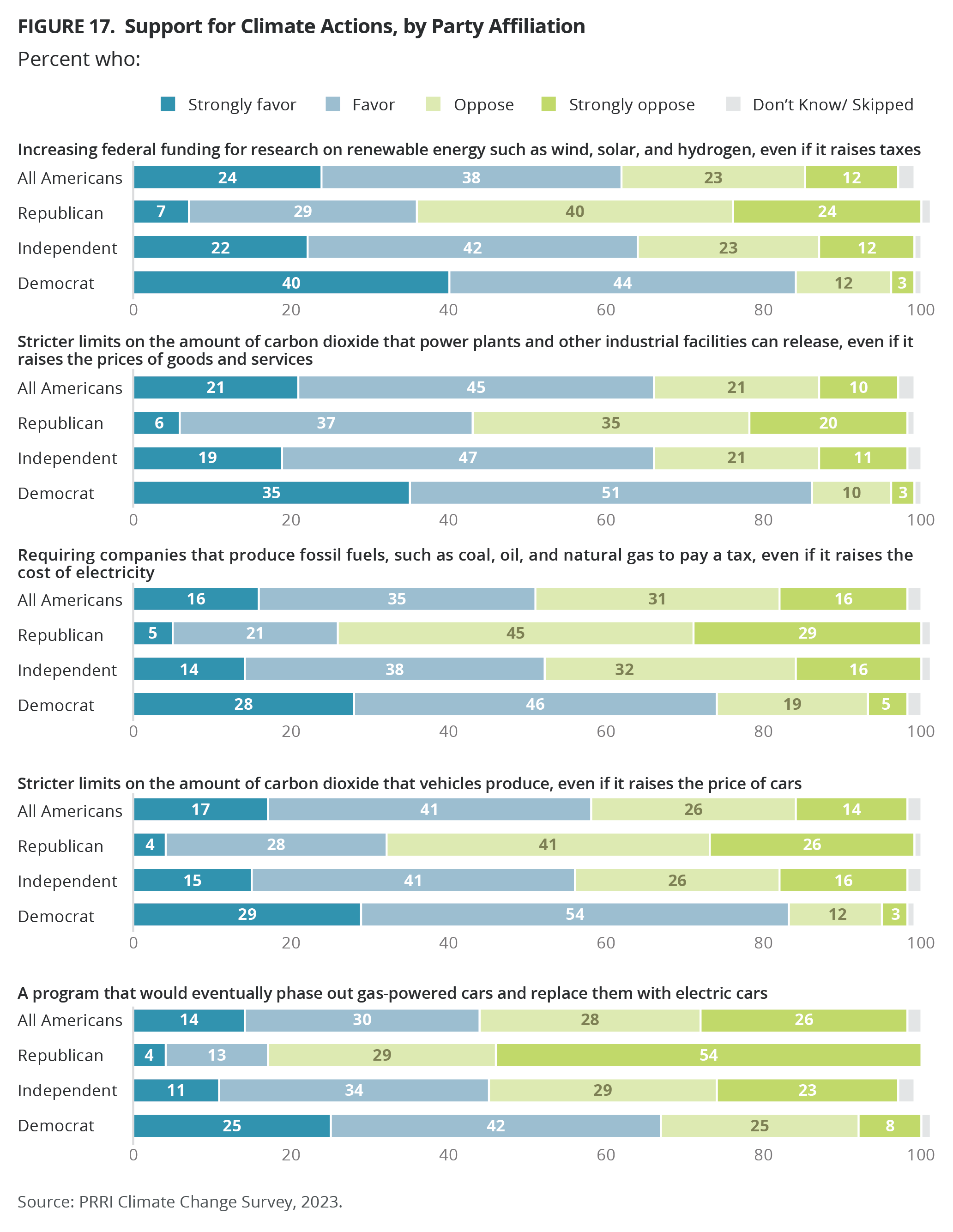
Changes Since 2014
Since 2014, Americans have become slightly more likely to support a policy that would put stricter limits on the amount of carbon dioxide that power plants and other industrial facilities can release, even if it raises the prices of goods and services (from 57% to 66%), while support for other policies has stayed relatively stable or decreased in the same period.
Americans are less likely to favor a policy that would put stricter limits on the amount of carbon dioxide that vehicles produce, even if it raises the price of cars now (58%) than they were in 2014 (64%).
Most of the increase in support comes among Democrats, while Republicans are less likely to support each of the policies included in the 2014 survey. Democrats are much more likely to support requiring companies that produce fossil fuels, such as coal, oil, and natural gas, to pay a tax, even if it raises the cost of electricity (from 56% to 74%), or a policy that would place stricter limits on the amount of carbon dioxide that power plants and other industrial facilities can release, even if it raises the prices of goods and services (from 70% to 86%).
Republicans have become much less likely to support increasing federal funding for research on renewable energy, such as wind, solar, and hydrogen, even if it raises taxes (from 48% to 36%) or putting stricter limits on the amount of carbon dioxide that vehicles produce, even if it raises the price of cars (from 51% to 32%).
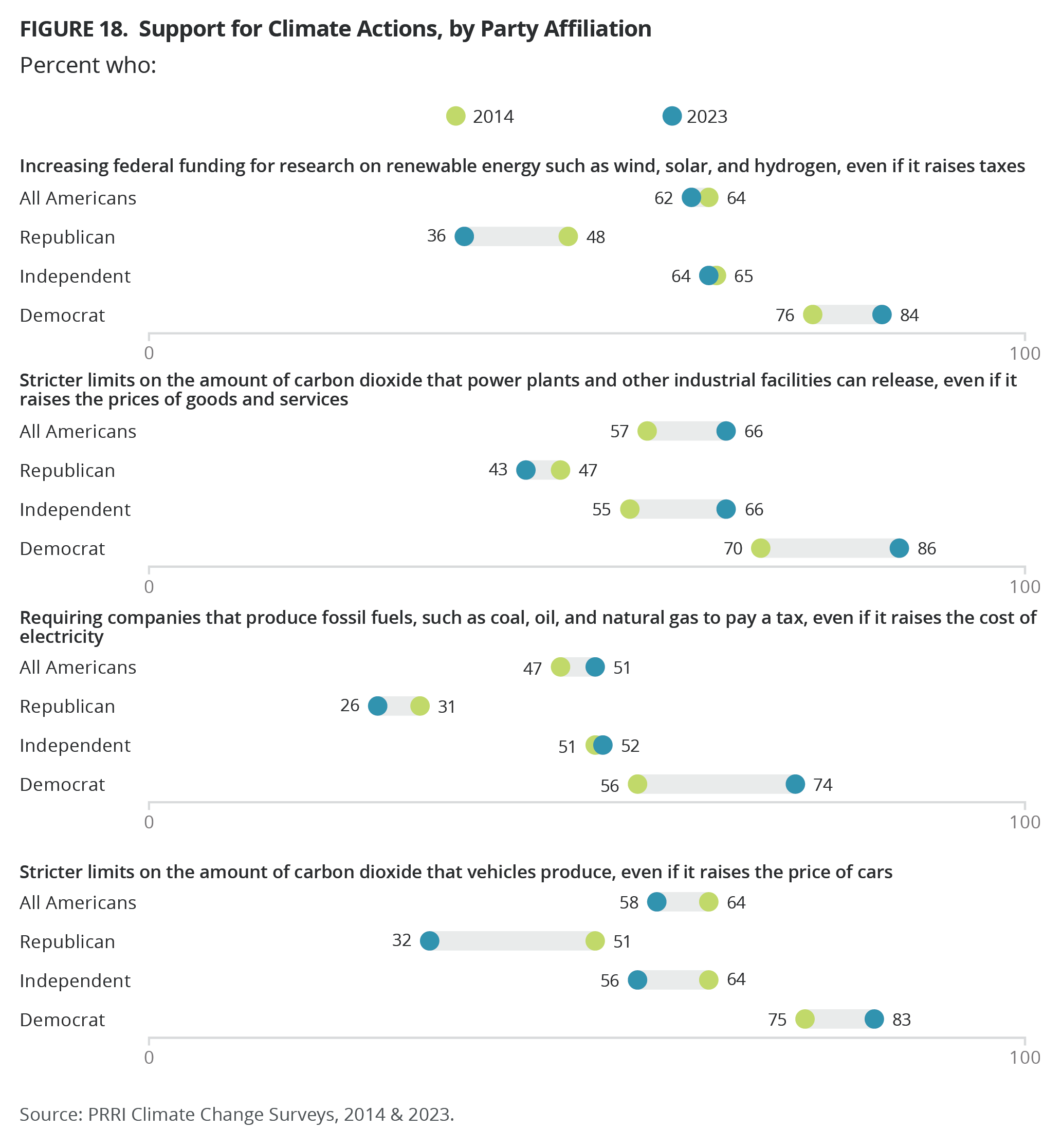
Developing a Climate Action Scale
To better understand which groups are most willing to support climate change policies despite their associated costs, PRRI developed an additive scale that combines the six aforementioned policies into a single scale and normalized their values to a score between 0 and 1. A score of 0 indicates strong opposition to every policy, while a score of 1 indicates strong support for every policy.[4] Examining mean scores for different demographic groups allows us to directly compare how likely a given group supports taking action on climate change, despite associated costs.
Religious Affiliation
White evangelical Protestants score lowest on the climate action scale (0.41) — the only major religious group to score on the lower half of the scale. In comparison, Latter-day Saints (0.51), other Protestants of color (0.51), Hispanic Protestants (0.52), and white Catholics (0.53) are close to the middle of the scale. Other groups of Christians of color and non-Christians score highest on the climate action scale, including Hispanic Catholics (0.60), Black Protestants (0.61), Jewish Americans (0.62); other non-Christian Americans (0.66), and religiously unaffiliated Americans (0.66).
Scores on the climate action scale increase with declining religiosity: those who say religion is the most important thing in their life (0.45) score lower than those who say religion is one among many important things (0.54), those who say religion is not as important (.58), and those who say religion is not important (.67).
Party Affiliation and Media Trust
Democrats (0.71) have a significantly higher score on the climate change scale than independents (0.56) or Republicans (0.40).
Americans who most trust far-right news outlets (0.32) or Fox News (0.39) score much lower on the climate action scale than those who most trust mainstream news outlets (0.66) or do not watch TV news (0.54).
Generation, Race, and Education
Younger generations score higher on the climate action scale. Members of Gen Z (0.61) and millennials (0.60) score similarly, while scores are lower among Gen X (0.54), baby boomers (0.54), and the Silent Generation (0.52).
Americans of color score higher than white Americans (0.55) or multiracial Americans (0.57) on the climate action scale, including Black Americans (0.60), Hispanic Americans (0.60), and AAPI Americans (0.63).
Americans with at least a four-year degree score higher than those who do not have a four-year degree on the climate action scale. Americans with a high school degree or less education (0.54) or some college experience (0.53) score similarly, as do those with a four-year degree (0.62) or a postgraduate degree (0.64).
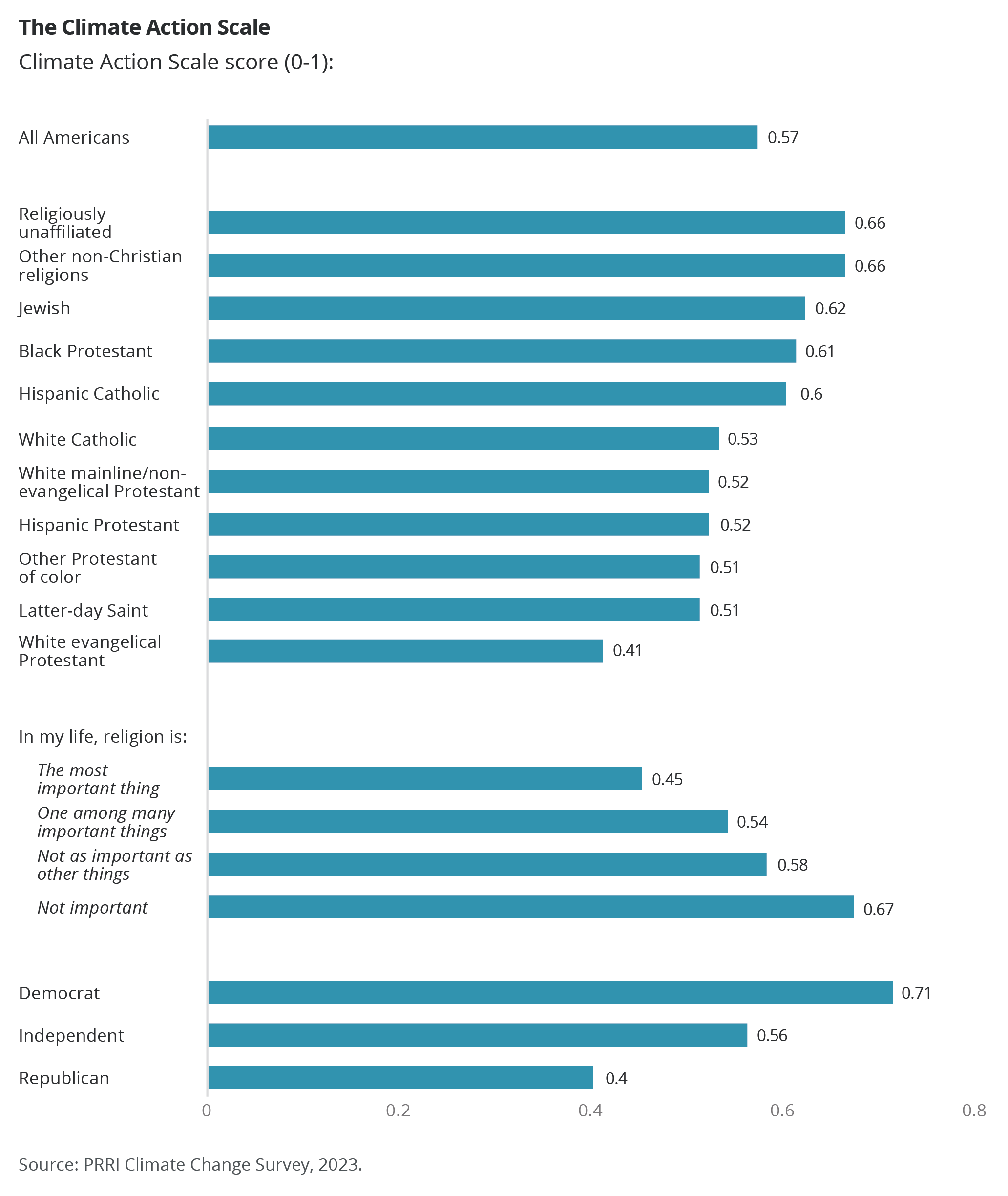
The Climate Action Scale and Views on Climate Change
Americans who see climate change as a key issue are more likely to have higher scores on the climate action scale than those who do not prioritize climate change. Americans who say that climate change is caused mostly by human activity such as burning fossil fuels (0.69) score significantly higher on the scale than those who say climate change is mostly caused by natural patterns in the earth’s environment (0.39), or that there is no solid evidence that climate change is happening (0.31).
Americans who say they would only vote for a candidate who shares their views on climate change (0.64) score higher than those who consider a candidate’s position on climate change as just one of many important factors when voting (0.61), or do not see climate change as an important issue (0.38). Similarly, those who describe climate change as a crisis (0.77) score higher than those who say it is a major problem (0.62), a minor problem (0.43), or not a problem at all (0.25). Furthermore, Americans who agree with the statement that the severity of recent natural disasters is evidence of global climate change score much higher on the scale than those who disagree (0.69 vs. 0.34).
[1] Previous iterations of this question on PRRI surveys did not include the option “there is no solid evidence that climate change is happening;” thus, we are unable to make direct comparisons. However, previous trends show a growth in the percentage of Americans who view climate change as caused mostly by human activity, such as burning fossil fuels, from 64% in 2011 to 74% in 2019 when the question was last asked, and a decline in the percentage of those who think climate change is mostly caused by natural patterns in the earth’s environment, from 32% to 25% during the same period.
[2] We categorize white evangelical Protestants as those who identify as a born-again or evangelical Christians. White mainline/non-evangelical Protestants refer to those who do not identify as a born-again or evangelical Christian but identify as Protestant. Protestants who identify with other minority racial groups that are non-Hispanic or Black are categorized as other Protestants of color. Other non-Christians include Muslims, Hindus, Buddhist, or Unitarian Universalists, or those belonging to any other world religion.
[3] This question was asked to half samples in 2023 and 2014; thus, many religious groups had too few cases to report.
[4] Two car-related questions were each asked of opposite halves of the sample. The policies of “stricter limits on the amount of carbon dioxide that vehicles produce, even if it raises the price of cars” and “a program that would eventually phase out gas-powered cars and replace them with electric cars” were combined when creating the scale so that it applies to the full sample. The statements have a Cronbach’s Alpha of 0.92, indicating that they scale together very closely.
Recommended Citation
“The Faith Factor in Climate Change: How Religion Impacts American Attitudes on Climate and Environmental Policy.” PRRI (October 4, 2023)
Survey Methodology
The survey was designed and conducted by PRRI. The survey was carried out among a
representative sample of 5,192 adults (age 18 and up) living in all 50 states and the District
of Columbia, who are part of Ipsos’s Knowledge Panel and an additional 348 who were
recruited by Ipsos using opt-in survey panels to increase the sample sizes in smaller states.
Interviews were conducted online between June 8 and June 28, 2023.
Respondents are recruited to the KnowledgePanel using an addressed-based sampling
methodology from the Delivery Sequence File of the USPS – a database with full coverage of
all delivery addresses in the U.S. As such, it covers all households regardless of their phone
status, providing a representative online sample. Unlike opt-in panels, households are not
permitted to "self-select" into the panel; and are generally limited to how many surveys
they can take within a given time period.
The initial sample drawn from the KnowledgePanel was adjusted using pre-stratification
weights so that it approximates the adult U.S. population defined by the latest March
supplement of the Current Population Survey. Next, a probability proportional to size
(PPS) sampling scheme was used to select a representative sample.
To reduce the effects of any non-response bias, a post-stratification adjustment was applied
based on demographic distributions from the most recent American Community Survey
(ACS). The post-stratification weight rebalanced the sample based on the following
benchmarks: age, race and ethnicity, gender, Census division, metro area, education, and
income. The sample weighting was accomplished using an iterative proportional fitting
(IFP) process that simultaneously balances the distributions of all variables. Weights were
trimmed to prevent individual interviews from having too much influence on the final
results. In addition to an overall national weight, separate weights were computed for each
state to ensure that the demographic characteristics of the sample closely approximate the
demographic characteristics of the target populations. The state-level post-stratification
weights rebalanced the sample based on the following benchmarks: age, race and ethnicity,
gender, education, and income.
The margin of error for the national survey is +/- 1.62 percentage points at the 95% level
of confidence, including the design effect for the survey of 1.51. In addition to sampling
error, surveys may also be subject to error or bias due to question wording, context, and
order effects. Additional details about the KnowledgePanel can be found on the Ipsos
website: https://www.ipsos.com/en-us/solution/knowledgepanel


